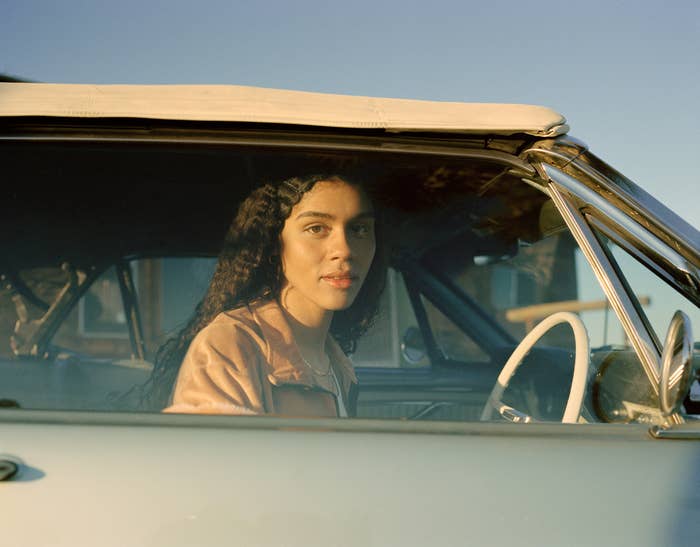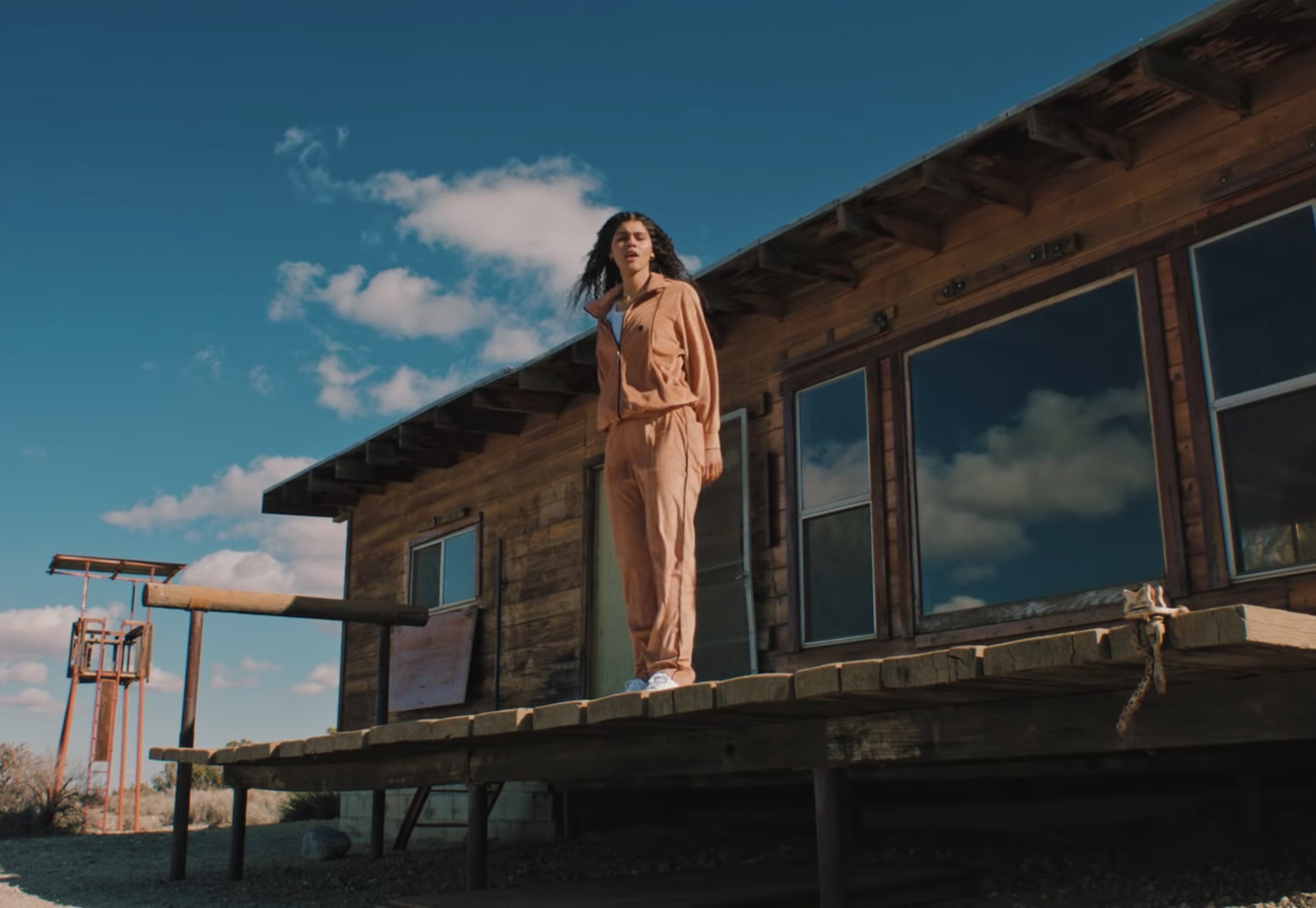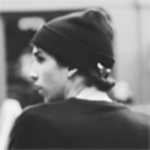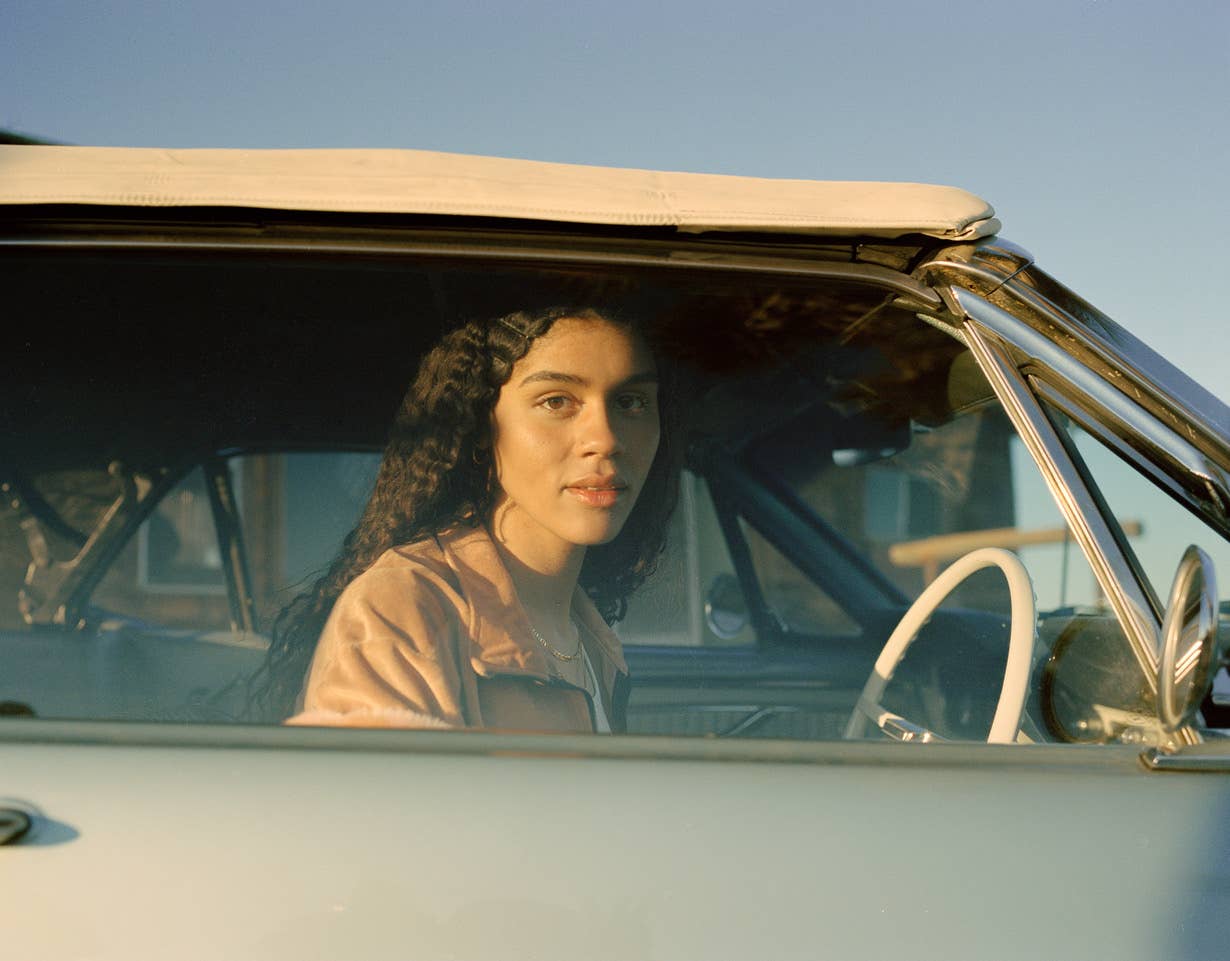
When Ama Lou writes songs, her ideas have a habit of manifesting themselves visually before ever turning into sounds.
Obsessed with films, the young London artist often finds herself throwing out visual references when communicating with producers. So when it came time to follow up her politically-charged debut songs "TBC" and "Not Always," she settled on the idea of self-directing a three-part film that would be soundtracked by an EP. Titled DDD, the collaborative project with her sister takes the form of a triptych of music videos set at dawn, day, and dusk—following the fictional character of a runner in an LA crime ring.
The result is a stunning audio-visual work of art that was guided by Lou across every step of the creative process. In addition to writing and directing the video, she took a hands-on approach to the music as well. "I wrote all the songs," she says. "They were out of my voice notes. Then I produced them with session musicians exactly how I wanted to do it. I would come up with the sounds and the chords and everything. I even helped mix them because I was being so particular with how I wanted the levels to be."
A classically trained singer, Lou's biggest strength might be her ability to present powerful social and political messages in a way that is easy and enjoyable to digest. As a result, she's gained the attention of admirers like tour-mate and friend Jorja Smith as well as Drake—who recently listed Lou as one of the artists who inspired him while he was in the studio recording Scorpion.
Over the course of her short career, she's already proven a willingness to push herself in new directions without fear of expecations. "I have no boundaries on myself and I kind of don't give a fuck what people think," she says. Watch Ama Lou's DDD short film below and continue for our full interview with the multi-talented London artist.
The last time P&P spoke with you was in 2016 after “TBC” came out. What was it like getting so much positive response to your debut song? Did you feel any pressure to follow it up?
I didn't really have any expectations because it was my first song ever. I didn't actually know what to expect, so the reaction to it didn't really make me feel any pressure. It was just like, "Oh, I've started. This is so cool." It was cool to start on a good foot, because sometimes people don't start that way.
The follow-up, “Not Always,” focused on gender, so your first two songs had really strong social messages in them. You’ve done a good job at presenting those messages in an accessible pop-friendly way, though. Why do you think that’s important?
I love melody. That's my thing. I wanted to be a songwriter first. Melody, the structure of songs, and how they intrinsically make people feel is really important to me. So when I was writing these songs, I didn't really have a plan to write a song about gender or a song about about Eric Garner or the Black Lives Matter movement or any of that. It just kind of came and I realized I had been influenced by these things. Then I incorporated them in my music videos and solidified the ideas of what I was saying.
Striking a balance between strong messages and good melody and songwriting is extremely important. I think there can be political songs or things that have really deep messages that you want people to hear, but they end up feeling like rants. But making songs sound beautiful will make people want to listen to them over and over again just for the melody or the musicality of the song. When they go read the lyrics and they're really interested in the song, they'll digest the message even better because they're already in love with the whole thing. It's not too harsh. It's digestible. It's osmosis. People will absorb it better than if you're just coming at their throats.
I have no boundaries on myself and I kind of don't give a fuck what people think.
Did you have any worry that people were always going to expect serious songs with political messages from you from then on?
I have no boundaries on myself and I kind of don't give a fuck what people think.[Laughs]. If you think too much about what people will think, you'll create something you don't want, then it becomes lost in the wind. After I released those first two songs, I just thought, "Okay, that's cool. I've done that now." I was getting loads of press about how I was a political artist and I thought it would be cool to switch it up now. So it's not inauthentic. That's still a part of me, but I didn't want to put any restrictions on where I could go with this.
The songs on your new EP DDD are tied together with an accompanying three-part visual and a fictional storyline. Where did that whole concept come from?
I wrote the songs and they were very bare-bones. Then I started having these vivid visions for a saga—this film I wanted put together. As I was writing it and fleshing it out with my sister, I realized that the music was a reflection of what I was thinking of. They fit together well. I realized I was getting visions of the visuals for the music. Then I went back and did the production for the EP as a score to the film. So on "Tried Up" at the beginning, you have these ambient desert sounds, which are synthetic but they kind of sound like hawks. I did that so when you watch the film and I'm walking through the desert at that exact moment, you're like, "Oh, I get it." A lot of people came to me and were like, "Oh, I understood the music so much more—the production especially—now that you've released the film."

You've put a big focus on your visuals. How important would you say the visual side is to you as an artist?
When I produce, I usually hear these sounds or feelings of what I want. And I kind of see it in my mind, which is cool. Then I have to translate that into a noise. I'm like, "It sounds like this." And I'll give some kind of reference like, "You know this feeling when you walk through here or whatever?" Then I'll figure out the sound and get it to the session musician. It does make me seem completely crazy all the time, but it is fun.
I do see loads of things visually. I was talking to someone yesterday who was getting into film. I didn't realize how many visual references I had for different things, in terms of relating them to music. I was like, "Wow, I've absorbed so much from films and different references from things over the years." I realized that's how I can translate and speak towards people, which is cool.
making songs sound beautiful will make people want to listen to them over and over again just for the melody or the musicality of the song. When they go read the lyrics and they're really interested in the song, they'll digest the message even better
You work as a team with your sister on your videos. Did she have a background in videos before these? Or how did that come together?
My sister works in film. She works on feature films as a camera assistant. Then she DPs my music videos or whatever. I had worked with other directors before. I had written the whole concept then passed them to this kid director, but I was intervening and telling them everything had to be like this and this. So when I was writing the concept for DDD, she was like, "You know you need to direct this yourself. No one else will understand what you're talking about. You're so particular. This is all you." So then we were fleshing it out at home and we were so detailed, because it was just such an exorbitant production. It needed to be down to the finest details. She already had this knowledge and I have loads of my film knowledge because of her. I'm obsessed with films and I watch films all the time, and she works in film. So we decided to work together.
You obviously have a talent for visuals. Would you ever think about directing videos for other artists?
Yeah, I have. I just started a production company and I'm definitely into being a director, aside from the Ama Lou name. I have so many ideas.
I heard you were in full control of this project from top to bottom, more than you have in the past—from the producing to songwriting, visuals, everything. Is that how you prefer to work?
Yeah, it was definitely a new experience. When I started out as a songwriter, I would go in with producers and write a song. I would do the melody and do my part. But then I would leave all the production and everything to them. I would trust in their sound and taste, then a song would come out of it. But with this, I wrote all the songs. They were out of my voice notes. Then I produced them with session musicians exactly how I wanted to do it. So I would come up with the sounds and the chords and everything. I even helped mix them because I was being so particular with how I wanted the levels to be.
I guess it is how I prefer to work now. I like to keep a balance, though. It's not like a dictatorship. I really do trust them and I love hearing other people's input and musical experience. I'm always trying to learn and get better at what I do. In terms of production and being in the studio making projects, I think it's really important to gain knowledge from people who have done it before. But I definitely am very particular. [Laughs]. So I like having control.
You recently went out on your first tour with Jorja Smith. How did that come together?
We first met when I supported her at her Electric Brixton show back in July 2017 and we became friends. We were hanging out one day and talking about her going on tour. We were talking about her support and how it would be cool if I supported her because we're completely different artists—we don't sound the same at all. The audience would be getting two totally different shows instead of just a less-developed version of her, which is usually what support acts are. So it was pretty simple, really. We went on tour and it was so cool because we both have a lot of respect for each other and we knew each other before, so it was more family vibes than doing something with a stranger.
That was your first tour and I know you hadn’t performed a lot before. Were you able to find a groove and figure out what kind of performer you are?
Yeah, I had loads of rehearsals and prep shows before. Like I said, I'm really particular so I had fleshed out what I wanted. I love performing and it's really addictive. I did find a groove and my voice got really strong. You're singing every single day, so you're really working on your muscles.
How would you describe one of your shows to someone who hasn’t been before? What should they expect?
It's really fun. At the moment, it's me and two male backing singers. I definitely go on a journey. I only have seven songs out, but I usually do some different material and breakdowns of songs I'm working on and shit. But it's very fun. Very high energy, I think. But then chill at the end.
I noticed Drake has been a supporter. He quoted “TBC” in an Instagram post, then named you as someone he was listening to while making his new album. Do you know how he discovered you?
I think he discovered me through Jorja. She was posting me up on her Instagram and of course she had already done features on his album, More Life. He's an innovator and he's always searching for new things, so I think that's definitely the way he found me.
Based on your output so far, you seem like an artist who would rather be patient and make sure everything’s perfect than rush and put out a bunch of music. Why do you like working like that?
It's definitely about a balance. There are some songs that I'll write and I could put them out the next next day. But when I was doing DDD, I was working out and perfecting this system I had for producing. DDD came out as a product of that. But I'm into both methods. I don't know what I'm going to do next.
At this point in your career, what do you think your biggest strength as an artist is?
Writing.
You don’t have to give anything away about what’s next, but I’m curious what you’re putting most of your time an energy into at the moment?
I think I'm in the swing of everything. I'm definitely in the studio every day, writing loads, and getting ready to release new music. I'm venturing now into this film world that I've opened up for myself. I think I'm just going to flood the streets with a bunch of Ama Lou.




